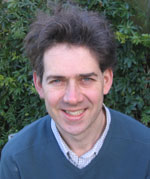Thomas de Waal, Author of “Black Garden”, in Yerevan; Addresses Karabakh Conflict
"We must remember that Karabakh was the home of Azeris as well", he states at Civiltas talk. 
Thomas de Waal, a British journalist and writer best known to Armenians as the author of “Black Garden: Armenia and Azerbaijan Through Peace and War” was the guest speaker at a conference devoted to the Karabakh conflict organized in Yerevan by the Civilitas Foundation. Mr. De Waal began by saying that he preferred the term “dormant” conflict over the much used “frozen” variant and called on major international institution, like the European Union, to take a more active stance regarding the establishment of support mechanisms to overcome the mistrust on both sides of the conflict and to create the necessary infrastructure to bolster any eventual peace settlement.
Civilitas Director Salpi Ghazaryan noted that Mr. De Waal has just come from Baku and asked the speaker about his impressions. He noted that for Azerbaijan the conflict is not just a question of Karabakh but also the territories as well and that the level of civilian debate is low on both sides, but especially in Baku where the political opposition has been effectively silenced. Mr. De Waal has been seen as a controversial figure in many Armenian circles for his views on Karabakh. For example, in February 2009 the NKR Ministry of Foreign Affairs issued a commentary criticizing de Waal's report "The Karabakh Trap". According to the Ministry, "de Waal has chosen the “scare tactics” as a means of persuading the Armenian party to the conflict". The question put before Mr. De Waal was how to bring the two negotiating parties to a general settlement framework acceptable to both without giving the appearance that either has made unacceptable concessions. Mr. De Waal made some general comments in this regard and answered that security and self-rule would seem to satisfy the Armenian side while the return of “non-Armenian” territories now under Armenian control and some interim status regarding Karabakh might be acceptable to Azerbaijan. Naturally, this point raised some eyebrows in the crowd. Mr. De Waal said it was vital to reach a consensus on some overriding points of interest and to stage a choreographed moment of mutual understanding. He also agreed that it was vital to tone down the war rhetoric coming out of Baku but that he saw negative stereotyping coming from both sides. As to the possible outbreak of a new round of hostilities, Mr. De Waal said that while he didn’t see this happening in the near term, it couldn’t be rules out in the long-term and mentioned waht he termed the “stupidity factor” in the equation. That’s to say that there’s an arms’ build-up going on in the region, especially in Azerbaijan, and that in five or ten years time, a more independent Azeri military just might be foolish enough to try something militarily. The speaker noted that the 1994 ceasefire has held but that the OSCE monitors are woefully unprepared or incapable of preventing any major conflagration. Mr. De Waal added that true peace wouldn’t be established in the region just by signing a document and that bridge-building, on a civil level, is urgently required to break down barriers and mistrust. He confessed that there is little being done in this regard. He also mentioned the revised Madrid Principles and described it as a 2-3 page framework that Baku has recently started to speak of in more positive terms. Mr. De Waal cautioned however that he has yet to meet any Azerbaijani official, even in off the record conversation, which has said that Baku would relent on its demand that Karabakh remain Azerbaijani territory. Mr. De Waal was peppered with questions from the audience after his discussion. One agitated female college student rose to challenge much of what he said, especially about the eventual return of the territories, claiming that she herself would go to fight on the frontline if war commenced.
 Videos
Videos Photos
Photos
Write a comment